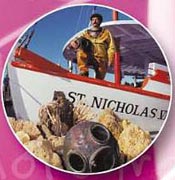| |
|||
|
home >> educational
resources >> getting
started >> publications >> poster
Explore Your Community: A Community Heritage Poster for the ClassroomWork and Play, Ritual and Celebration: Cultural Heritage in Your CommunityExplore Your Community Poster Panel ThreeMost people share with others at least some of the experiences of family life, ethnic origin, occupation, religious beliefs, age, recreation, and region of the country. We all belong to one or more "cultural" groups." Folklife and cultural heritage flourish in all of these groups and affiliations, where members gather to work, play, and celebrate together. Here are some activities you can do to explore the common beliefs, customs, and traditions of groups in your community. What You Can Do Family Folklore: All families have stories they tell about each other when they are together, and special customs, recipes, and other traditions that only they know. Interview one or more of your family members about a family tradition. Write about your findings and ask family members to comment on what you've written. Use family photos to prompt memories. Celebrations and Rites of Passage: We all have participated in rituals and celebrations—birthdays, baptisms, high school or college graduations, marriage, religious festivals, community fairs, New Year's Eve parties, and Thanksgiving and Fourth of July gatherings and events. Document a specific holiday celebration that you know something about. Interview members of your community at local events or family gatherings, take photos and videos, or make sound recordings. Develop a school- or community-based archive based on your research material. Do a comparative study of the same event or holiday as celebrated by several different families. Occupational Folklife and Work Traditions: Many occupations have their own special language, stories, tools, and customs. Interview a baker, teacher, computer programmer, car mechanic, farmer, salesman, nurse, or factory worker in your community about his or her work. Collect work-related stories, or special terms, pranks, sayings, jokes, legends, and songs. Document the skills associated with the job on video or in photographs. Investigate how the job serves the community. Research how the job was different in the past. An entire class might study members of different occupations and work places and combine their research to create an occupational portrait of the community. |
| |||

